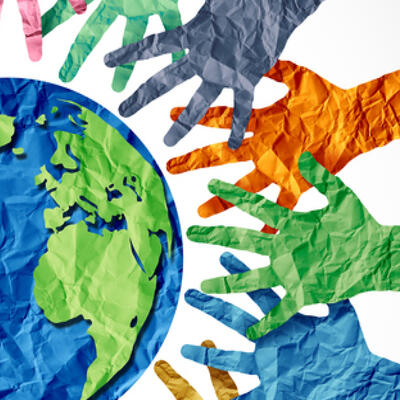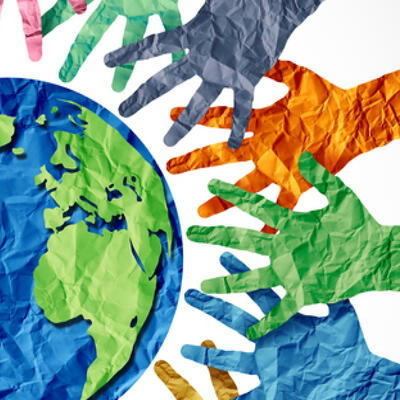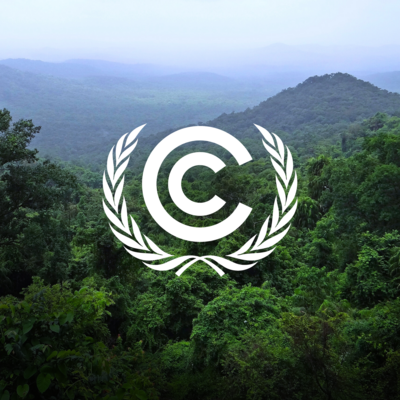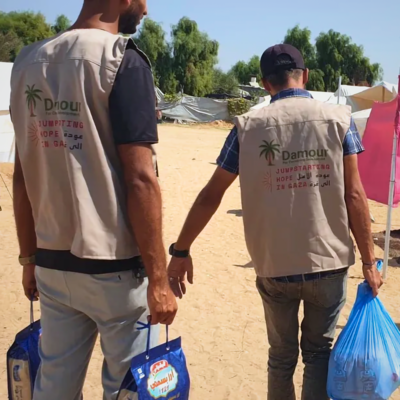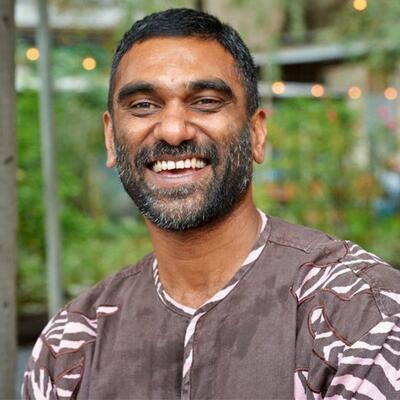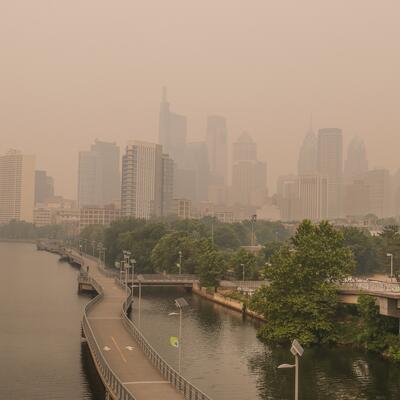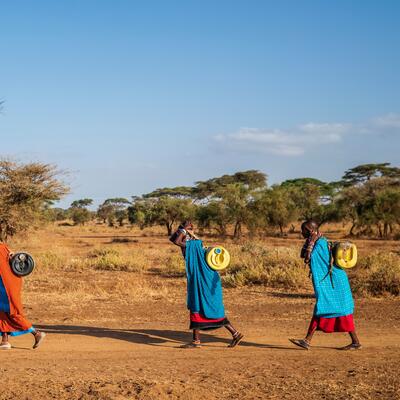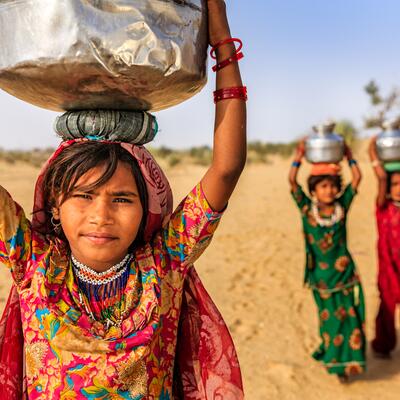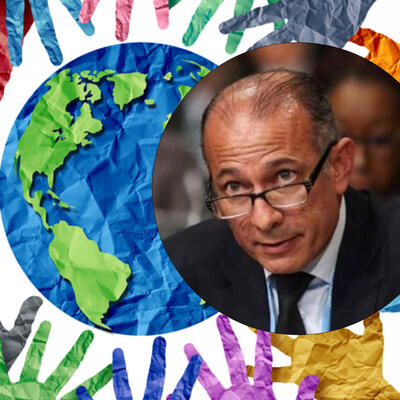
Bonus COP27 Preview: Egyptian Ambassador Wael Aboulmagd
Guests
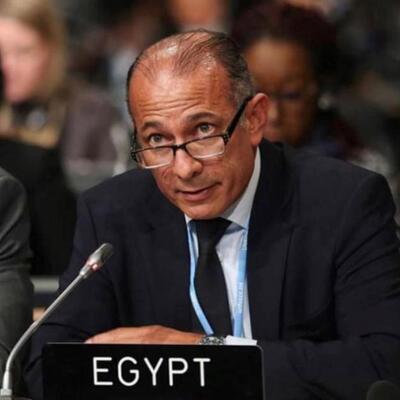
Wael Aboulmagd
Summary
The Paris Agreement requires every country to declare their own nationally determined contributions, or NDCs, for reducing emissions. Last year at COP26 in Glasgow, it became clear that even the updated targets would – at best – limit warming to 2.4°C, almost a full degree above the 1.5° goal.
Wael Aboulmagd, Egyptian Ambassador and Special Representative of the COP27 President, says that it’s incumbent on Egypt, as the incoming COP Presidency, to press every other nation to update their pledges, to help close the gap.
“Egypt, hopefully, led by example. We updated our own NDCs, which showed much more ambition,” he says. “And we’re asking everyone else to do it.”
While Egypt’s updated NDC may be more aggressive than before, Climate Action Tracker still rated their actions as “highly insufficient,” noting that even under its most recent targets, Egypt’s emissions will increase by around 50% above today's levels by 2030. Aboulmagd argues that, given the historical differences in development between the global north and the global south, Egypt’s course should be perfectly understandable:
“Developing countries are entitled to continue to grow until they peak. Because developed countries had already peaked and started way back even in 1990 after consuming all of the carbon stakes that we all are supposed to be sharing. So, as developing countries are struggling with debts, struggling with poverty, struggling to meet their legitimate sustainable development objectives, the legal framework is tailored to ensure that developing countries are not supposed to starve to meet these targets.”
This year’s COP is being framed as “the implementation COP,” where the stated goal is to move from negotiations to action. While many have complained that the COP process, with its focus on consensus-based negotiations, moves too slowly, Aboulmagd thinks this year’s focus on implementation might lead to speedier outcomes.
“The action agenda, the implementation side, doesn’t suffer from that ailment, because you don’t require every single entity or government to come on board.”
Loss and Damage, the idea that the biggest emitters should pay for the damages inflicted on low emission countries that are suffering the worst effects of the climate crisis, will be another huge topic at COP27. Ambassador Aboulmagd says he has a good feeling about having Loss and Damage as an agenda item. “I think we are in a significantly better place than we’ve ever been on that platform.”
Related Links:
COP 27 Goals
Full Transcript
Note: Transcripts are generated using a combination of automated software and human transcribers, and may contain errors. Please check the actual audio before quoting it.
Ariana Brocious: This is Climate One, I’m Ariana Brocious. The 27th international climate summit known as the Conference of Parties or COP takes place next month in Egypt. If you haven’t listened to our other show from this week, Countdown to COP27: Feeling the Heat, I’d recommend starting there to get a fuller scope of what we can expect nations to focus on. In this special episode we’re airing our full length version with Wael Aboulmagd, Egypt’s ambassador to Brazil and the Special Representative of the COP27 President. He joined us from Cairo. Here’s Climate One host, Greg Dalton.
Greg Dalton: The Paris agreement requires every country to declare their own nationally determined contributions or NDCs for reducing emissions. Last year at COP26 in Glasgow, it became clear that even the updated targets would at best limit warming to 2.4°C – almost a full degree above the 1.5° goal. So, governments decided to give themselves another year to revisit and strengthen their targets. Here we are; what are you seeing about those goals?
Wael Aboulmagd: As you rightly said, they’re called NDC so they happen to be nationally determined contributions. So, as you rightly said, we’re still not on track to keep the target temperature goal of the Paris agreement alive. The 2° and hopefully the 1.5 target. So, as incoming presidency what we are able to do and continue to do is to press everyone to encourage everyone to update their NDCs and that was part of the decision coming out of Glasgow inviting countries who already have presented their NDCs and aren’t due for a number of years to have their second NDC out to update their NDCs. Egypt, hopefully, led by example we updated our own NDCs showed much more ambition. And we’re asking everyone else to do it. So, that’s on the legal obligation sort of side of the things. But on the other hand, there are multiple pledges and challenges going out to various sectors. For example, you have the methane pledge which came out of Glasgow. And you have other initiatives by various sectors leaders and private businesses. Those are also making contributions so that collectively will hopefully add to whatever is in the NDC. So, the measure I’m trying to say measure isn’t only what’s in the NDCs, of course, that’s the quantified one in the legal structure part but there are other parts as well. And then you also have issues that came out such as the just energy transition partnerships that the first model that we all heard of was the one made in South Africa. So, there are let’s say parallel tracks, but also a lot of action on the ground to compliment or supplement the legal track. And that’s what in our prerogative or authority as incoming presidency that we can do we continue to urge we’ve been calling one on one quietly with various countries encouraging them, A, to update NDC and B, most importantly, that update should be very ambitious.
Greg Dalton: So, we’re seeing some sector approach. We might also put Kigali ratification in the US and other countries in there. Russia’s war on Ukraine is roiling energy markets in Europe and globally. Is there a risk that countries are using that war and resulting disruptions in energy markets to delay action or switch back to dirtier fuels as gas prices rise?
Wael Aboulmagd: That’s a legitimate concern. Many have expressed that to media and society and even within government circles. There is this concern that the crunch the energy crunch and the rising crisis or lack of availability obviously of energy particularly in Europe will encourage people to go back because they need to meet their immediate needs. We’ve been telling everyone none of these should be used as a pretext for backtracking or backsliding on pledges and commitments. And we’ve heard and we have to take it all for their word on this matter especially coming out of Europe that they are still on track for their targets and this is a very temporary measure that they need to take. But of course, you’re absolutely right in insisting and we are also insisting that this should not be a pretext. Not only that, but you mentioned the consequences of the war in Ukraine on the energy market. There are impacts on the food supply and markets and there’s on fertilizers. But also, we’re still all, all the world is in effect in the aftermath of a post pandemic situation where recovery hasn’t been even across the board. And also, many countries are still under threat of slowdowns and even recession. So, it’s a complicated sort of compilation of variety of challenges under which this COP is taking place. The flip side of it is I think there’s a very broad conviction that nothing, climate will not wait for us; there is no time to waste. And that every measure delayed is a measure that is going to be that much more difficult to implement and multiple times more expensive to implement. So, I think there is this general recognition of the urgency and that time is of the essence that we need to move forward.
Greg Dalton: As you mentioned in July, Egypt updated its own plan to reduce emissions. But in August, Climate Action Tracker rated Egypt's actions “highly insufficient.” Noting that even under its most recent targets, Egypt’s emissions will increase by around 50% above today's levels by 2030. So, what is Egypt doing to address this, especially as it plays that leadership role and host as you’ve noted?
Wael Aboulmagd: Well, there are two ways of looking at this. And the raw figures in making that claim but at the other end is ignoring the reality of the climate realm in its totality. Developing countries are entitled to continue to grow until they peak. Because developed countries had already peaked and started way back even in 1990 after consuming all of the carbon stakes that we all are supposed to be sharing. So, as developing countries are struggling with debts, struggling with poverty, struggling to meet their legitimate sustainable development objectives. The legal framework is tailored to ensure that developing countries are not supposed to starve to meet these targets. So, if they look at it from that way, they can make that claim. But the reality is the system is structured to compare not what we’re doing with what they anticipate but what we are doing with the business as usual scenario. So, if you compare it to the business as usual scenario, you’ll find significant reductions. Lastly on this point, but this doesn’t only apply to Egypt. Many, I dare say, most developing countries are entitled and actually have linked their ability to fulfill these NDCs with the availability of support. Because countries cannot do it on their own without financial technology and capacity support. So, that’s another caveat to a lot of the developing country NDCs that realism requires that we take into consideration because many of these countries made less than 0.0001 contribution to the situation we are in or at this moment struggling with multiple developmental challenges. And they need to find the right balance with doing their fair share in the global effort to combat climate change while also not starving their people and providing the needs they need for elimination of poverty.
Greg Dalton: There’s no doubt that most of the carbon up there is red, white and blue, which means it’s American and British and Russian and French for sure in unequal and unjust situation. And the goal we know is to decouple economic growth from carbon emissions. And if you’re saying that’s not possible, that seems to me saying that fossils are still cheaper these days, when we hear a lot in the West that clean energy is the cheapest wind and solar wind in the marketplace because they’re so cheap right now, but is that not the case. If you're saying we need fossils because it's we need assistance because fossils are still cheaper, renewables are still more expensive.
Wael Aboulmagd: Absolutely not. No, no. And you’re right in the fact that I mean solar I think alone has dropped by about 80%compared to just a few years ago. You’re absolutely right. But it’s not just a matter of pulling a plug from fossils and plugging in solar or wind or other renewables. There are infrastructure requirements, there are retiring existing long-term investments that exists. There are great upgrades. There are multiple areas that developing countries if you go to Sub- Saharan Africa, you’ll hear the actual story. That’s why we’re launching one of our initiatives, I don’t want to jump in now and go to initiatives, but one of them is just energy transition for Africa. Because that is a very particular case I think it maybe similar to other developing countries but reality remains that it’s not just a simple, we’d love everyone to leapfrog from, you know, where other started to renewables immediately but there is a process that has to take place to ensure that this happens. And it’s not just a choice issue but it is a matter of the infrastructure available and the grid as I mentioned and many other factors. But the full commitment is there everyone wants to do it and that’s why I mentioned in NDCs; they are conditional. We’re going to hit this target of renewables by this date but we need the support to move from one area together. Last point here, that’s exactly what happened to South Africa. It is a transition. It's $8.5 billion mostly in loans and concessional loans, maybe some grant component, I’m not familiar with the full details. But it acknowledges that you can’t just move them whole overnight you needed that amount. Without that amount it wouldn’t have happened to South Africa and will be very difficult to happen elsewhere.
Greg Dalton: Let’s go to that, you know, the broader meaning of this being held on the African continent and Egypt in particular?
Wael Aboulmagd: Well, I should say first and foremost, this is a UNFCCC intergovernmental process where it’s a COP for everyone. But you’re absolutely again right here in that the very fact that it’s happening in an African country which is familiar with the priorities, the needs, the challenges of the continent that allows us as incoming presidency particularly in the part that we have some discretion in determining which is the action agenda. The negotiations are negotiations no matter where they happen and you can’t change that geographically, you know, wherever you are geographically it will continue to be country-owned country driven by everyone in the process. But to your point, it is the familiarity of the challenges of the continent that enables the host country, in this case, Egypt, to tailor many of its initiatives for the needs and the challenges of the continent. So, this is where you will definitely see some more emphasis on African needs particularly in the area of adaptation, but also on finance.
Greg Dalton: And we like to talk about, you know, humans and systems here on Climate One. So, what climate impacts are you personally seeing in Egypt?
Wael Aboulmagd: First and foremost, water, water, water, water. Particularly because Egypt is a very, very arid country we rely on one source more than 95% of our home use, agriculture, industry – everything depends on the River Nile. So, any disruptions caused by climate change in rainfall, in vaporization, many, many other aspects just in the area of water resource management is a problem for us. Second, we rely heavily on agriculture. Egypt is a country of 100 million people that need to be fed. We have the Nile Delta which we rely on of course but we import a lot of food products as well. So, food security, water security are two issues where the impacts are most evident. Third, of course, rise of sea levels. I just mentioned the Nile Delta which is one of the highest density areas on earth and you have about 50% of Egyptian population live in that triangle the Nile Delta. So, the rise in the Mediterranean by even a fraction of a centimeter means salinization and acidification. And that you can just imagine the impacts on the economic and social and other impacts that this would have on a very highly dense part on the livelihoods of everyone living there, not to mention the food security aspects. So, those are to mention a few.
Greg Dalton: Last year the COP presidency had a goal of consigning coal to history. Since then, the global use of coal has actually gone up and is set to return to an all-time high. Egypt doesn't burn much coal but what lessons do you take from COP26 in Glasgow that inform how to proceed this year in Sharm El-Sheikh?
Wael Aboulmagd: The reality of all multilateral diplomacy is and particularly in this process is that it is consensus-based process where you can imagine the need to find alignment in 190 sovereign states. It’s not an easy task and any single country has the ability to say, you know what I’m not comfortable going at this pace on this issue, not just on coal. We were all there of course and we saw the issue of phasing out versus phasing down and all of that. And it is of course something to be lamented that the use of coal has increased. I haven’t seen the exact figures where it has increased and who caused the increase, so I’m not gonna attribute responsibility to anyone in particular. But you mentioned earlier on what’s happening in Europe and we’re hoping, and I hope after this if I go back and look at the figures available that’ll just be a spike caused by this emergency situation, which we all hope will not be lasting much longer. But again, to the broader picture all fossil fuels have to have a plan. And that’s why one of our main events that we’ve added this year is the decarbonization thing. Where we will talk about the biggest emitters in industry. Basically, you have your cement you have your fertilizers, you have your steel and of course oil and gas to see who are the best people in the world who are decarbonizing. What are the governments and private sector entities and as well as financial institutions not to mention the industries themselves doing to actually decarbonize? So, we have to have a closer look at this it’s a full day, morning to night just this decarbonization issue, and of course coal is in the midst of all that.
Greg Dalton: The death of coal has been heralded many times and it always seems to come clawing back. COP27 is being framed as the implementation COP where the stated goal of moving from negotiations and planning to implementation. Does that mean things are going to go even slower than they have recently? Because implementation is hard.
Wael Aboulmagd: No, actually I’ll surprise you with some good news. The pace that which multilateral negotiations go forward is the slowest imaginable simply because you’re seeking the lowest common denominator that will enjoy these 190 sovereign states with very interest and understandably so. So, we’re not kidding ourselves, we're part of this and we know how it works. The action agenda the implementation side doesn’t suffer from that ailment because you don’t require every single entity or government to come on board. So, with the methane pledge for example, which is an implementation tool, obviously and other initiatives that we’ll be watching. You’re welcome to join, if you don’t like it, don’t come but we like everyone to come on board. So, you’re not waiting for the 190 disparate views to come on board. You’re willing to start with the few who are convinced that this is something they’re willing to commit to. And you can use that and compare with a number of the initiatives that we’re launching. We’re launching something on agriculture, something on water resource management. We have something dedicated to Africa. We have a very successful social security kind of program for industries and multiple people who are affected by climate change that were scaling up. It’s been implemented that is called decent life. And this is being scaled up for Africa and we’re presenting it. There’s a waste management initiative. Waste management is of course an environmental issue which also has emissions sides to it. So, and that’s for Africa as well. So, there are a number of initiatives these are all action oriented that’s why we call it the action agenda and that is the definition more the implementation of the implementation narrative that we’re talking about.
Greg Dalton: That action costs money and yet investment tends to go to countries that need at least because they’re perceived to be less risky. So, what could be done to encourage private capital flows to be directed to fuel that implementation you’re talking about?
Wael Aboulmagd: You’re again, spot on on the finance side. But in tailoring all of our action agenda aspects we did nothing alone. We held workshops and seminars in Cairo in our building here for the MDBs, for private sector, and for governments from around the world. We had two or three rounds of these talks and we tweaked and fine tuned some of the narratives that we were creating to ensure the broadest buy-in by as many partners from outside governments. Of course, we have the beneficiary governments but you want the development partners and the developed world to come on board. We want to the MDBs to be there and you want private business to come in. But to your point, there is a problem with global climate finance. I’ll set aside what is under negotiation the $100 billion you’ve heard that. We’re looking at the new collective quantified goal for host 2025 doubling adaptation, all that that came out of Glasgow I’ll still call it the realm of the multilateral negotiations. But the reality figures out there are disturbing to say the least. The amount of climate finance now coming from private has exceeded public clearly. And the reality that you just pointed to is fully accurate in private business is defined by seeking profit. So, there are opportunities and the overwhelming percentage of private business goes to investment, A, in developed countries and, B, in mitigation efforts which is fine, that is good. We need to reduce emissions. But what is the flipside of that is that adaptation is completely starved of private investment. And this threshold or yardstick of bankable projects that everyone is preaching to the world just doesn’t apply to adaptation or a very, you need to stretch your definition of adaptation to find a project in protecting Egypt’s delta from the rise of sea level where there’s a profitable project. So, we need to find the formula that ensures that whatever non-profit driven monies are focused more on the adaptation side. I had this conversation a couple of weeks ago with philanthropists. The world’s largest philanthropists were there and I told them you guys are not there in it for profit. You’re benevolent, you are noble, you want to make a difference. Yet, A, and these are figures from the US in particular, about 2% of all US giving is going to climate, okay. That’s number one. Number two, whatever money is going to climate is going to climate in the US in the country of source. Three, it’s not going to adaptation. I looked at charts that are identical to those of the private sector and I thought, you know, you guys should be the flipside of the private sector. You should be going to where the need is most and no one else is going and say I’m making a difference. But if you’re philanthropy money goes to where the private money goes, it’s a drop in an ocean because you’re a fraction of what is being becoming available from the private sector. So, why not increase the impact by going where they can unlock technologies, we didn’t mention technology finance is important. But to move to renewables or to adapt technology is key. And you mentioned it with the price when the price dipped of renewables that’s when Egypt started building our one of the world’s largest solar farms. If the prices had not dipped, we wouldn’t have been able to set those targets. So, philanthropies, private money that’s part of the finance.
Greg Dalton: I believe that’s starting to change. Laurene Powell Jobs created a $3 billion spend down foundation over 10 years that’s aimed at climate justice. Some of that is international but yeah, I take your point that a lot of spending is toward mitigation which clearly creates a revenue stream, you know, you’re generating electricity probably whereas a seawall or marsh or something like that doesn’t generate income that attracts private capital. You said that we need to come up with creative ideas for financing climate adaptation for the reasons you just cited. So, what are some examples of creative ideas for funding climate adaptation other than philanthropy that you’ve just cited?
Wael Aboulmagd: Well, there has to be a revisiting I can say this, I mean, other people are gonna be negotiating these issues so I don’t want to go into that territory and prejudge their outcomes. But what we’ve heard from many people for example MDBs multilateral development banks, and those are many but they have shareholders. And shareholders have to speak to the administration of those fund banks, you can’t, and these are not my words, Secretary Kerry and I think Franz Timmermann from the EU and others use pretty much the same language. You can’t try to work like a AAA financial institution. You are development banks and we need you to adjust for the reality of the world where climate is the existential threat to humanity. And they need to be less risk averse. They need to shift their thinking to address the actual needs in many of the countries that they’re working at. Also, the issues of de-risking have to be a big part of it. You mentioned getting loans and moving forward; it is not that easy especially of the debt crisis in many developing countries. So, there are creative ideas I don’t want to get into many of them because some of them are under negotiation in fact in Sharm El-Sheikh.
Greg Dalton: And there’s been a lot said recently about the World Bank. The biggest MDB, multilateral development bank, not doing enough and that bank, what would you like to see from the World Bank?
Wael Aboulmagd: The World Bank is a great institution. They’re doing amazing poverty elimination work around the world. So, I don’t want to say anything negative about them. They have a very, very effective program in Egypt, and this is beyond the climate realm. And most recently, we’ve engaged with very, very senior leadership in the bank and they’ve been very forthcoming and I’m supposed to get back to them right now. They’re offering a lot of help to us with regard to COP. So, I think there is a realization within the bank of the importance of issues of climate and that it is inevitable that they move forward a little bit more aggressively on the issue of climate than has been the case in the past.
Greg Dalton: You and your country tried to put loss and damage at the center of this international conference. Yet, rich countries are reluctant to put money into loss and damage because of possibly liability concerns. Are there alternative mechanisms that would make loss and damage payments more palatable? For example sometimes when this comes up domestically, there’s like a liability shield, we’ll, you know, give some money but you can’t sue us for our past sins, that sort of thing.
Wael Aboulmagd: You described it well. I think the world has moved beyond the liability roadblock. That has been something over the years that held back the conversation. The last days of Glasgow were not the most pleasant for those who prioritize the issue of loss and damage. People left with a bitter taste in their mouths, I should say. I was literally in the room with many of the small islands and you could sense the frustration at the delay and procrastination that happened. And even in Bonn, as recently as the subsidiary bodies meaning which is the halfway point with COP that took place last June, was unpleasant. We don’t want to take too much credit but after Bonn, we held what I think was a very, very helpful meeting of the heads of delegation. There’s something called pods. It’s an internal informal process within the climate change arena whereby heads of delegation representing the highest technical level in every government come together in an informal setting. No obligations, nothing, let’s have a conversation, a serious one. We held that two- or three-day meeting here in Cairo just a few weeks ago and the stars aligned. I don’t want to take credit, we were smart, we were ready, I don’t know. It was, things just came together and people genuinely listened to each other. No one was denying the suffering. We have multiple parts of the negotiation process. One of them is something called the Santiago Network, that’s essentially about building capacity. The main point of course is financing, finding funds to help countries. So, I think we’ve made some progress at least in the area of, I can’t speak for anyone or say that this is final but we have a good feeling about having an agenda item, we have now an agenda item, on the agenda to discuss the financing aspects of loss and damage. So, we’re inching closer that was a very good meeting nothing is done until it’s actually done. So, we’ll see that on the 6th of November at the adaptation of the agenda. But I think we are in a significantly better place than we’ve ever been on that platform. You said that we prioritized it, issues prioritize themselves. We don’t get to choose. So, last year just because it was the last piece of the puzzle it was Article 6 because it was the last part of the Paris agreement. So, everyone was talking all the questions all the media I did, no one was talking about anything but Article 6 as if there’s no other thing. Loss and damage is cental because it’s important and there’s realization of how sensitive and important it is to many impoverished countries who have done very, I dare say nothing, to cause their predicament. So, it is one of the main issues but that doesn’t mean we’re not going ahead full steam on the mitigation work program on the adaptation the global on adaptation of course on the finance side.
Greg Dalton: Right. We’ve all seen the horrifying images out of Pakistan which is just painful to even talk about. What is a just transition mean to you and how is that being worked into the framework in the negotiations?
Wael Aboulmagd: I think this is sort of a principle that has emerged and has become acceptable that no one can do anything overnight by degree. That everything has to be at transition and that’s logical, obviously, but it also has to be just, because there are many details involved. A transition in the United States will not be the same as the transition in Greece or one in Chad. So, justice as a notion is something that most people, most reasonable people would agree has to be a component. And many lament that the process is not a completely just one. And that’s why the notion of equity also you hear it a lot echoing in these discussions. So, it has to be a just transition. Because if you’re talking about a small net exporter of gas, let’s take Suriname or Guyana in the north of South America. Very, very underdeveloped countries with significant social and economic problems. And you tell them, you know what, you guys found some gas off your coast but that has to stay, you know, under the soil. When other countries have built fortunes and sovereign funds that will allow six generations not to work if they didn’t want to and still live off the planet essentially. So, that’s the justice notion that we have to take into consideration multiple factors if we are going to ask these people to make that contribution. And the value of the amount of stranded assets to them is the difference between continued poverty. So, if we’re gonna ask them not to, there has to be a mechanism, a just mechanism collectively to bear the burden of keeping this underground. This is the notion of justice that I think most reasonable people will accept has to be the foundation for a transition.
Greg Dalton: Well, let’s apply that to Brazil. You are also Egypt’s ambassador to Brazil. There’s a very important presidential election underway. I read an article in Bloomberg recently that said that Bolsonaro and Lula da Silva actually are not as far apart, they’re far apart politically, but when it comes to the Amazon, they’re not as far as people might think. So, what’s at stake in that election? I know you can’t meddle in the domestic politics of the country where you represent Egypt. However, there are global stakes here.
Wael Aboulmagd: There are global stakes because everyone acknowledges that the Amazon is part of the lungs of this planet and that it is a sink and that it is sort of the flipside of emissions basically. And there are expectations of every government to be responsible, to act responsibly and to maintain the forest. I don’t want to get into the details because there are counterarguments put forward by various parties. It is a very sensitive issue inside Brazil and it is an international issue in Brazil’s relations obviously with many countries. The elections are of course an internal affair for Brazil. You had the first round with two candidates closer than people anticipated. There will be a runoff on the 30th but there also have been changes in parliament and in the governance leaning towards right. So, it’s going to be a delicate balance in Brazil moving forward. But I think there is a general recognition that the Amazon is a big issue for the world and that there has to be an accommodation and understanding and support for Brazil in this regard to ensure that this global asset is maintained as pristine as possible.
Greg Dalton: You’ve talked about industry moving ahead which doesn’t require consensus, it can be voluntary action. What initiatives are you most excited about or hopeful that might lead to signed binding agreements?
Wael Aboulmagd: We’d love to see everything signed and binding. But none of this is actually signed and binding unless it’s a cooperation, you know, between a specific country and an entity. I think green hydrogen is creating a lot of excitement. It has a lot of potential. It’s still an emerging market and I hope that it remains an open and free level playing field kind of market because we’re seeing some distortions that might affect this global market. But this is something that Egypt in particular is paying a lot of attention to because of the potential there because we have the ability to be for export of green hydrogen. We have the ability to produce more renewables to make it green. And we are very close to Europe which has a clear need for clean energy. So, we see the potential there and the relative advantage that we have. So, this is creating a lot of excitement. I don’t want to preempt anything but there will be a significant announcement of a launch of something happening in Egypt on green hydrogen. So, this is one positive area. There’s something else it’s not related to emissions but it goes back to the point on loss and damage. There’s something many of you may have been hearing about it’s called the global shield. It’s an initiative on loss and damage it’s a combination in fact of measures to assist countries avoiding the liability conversation. And Germany took the G7 which was I think at first reluctant now it’s been embraced. And I even heard that G20 is coming on board so this is something else we’re excited to see. It’s a partial solution; it doesn't address the complex full array of issues under loss and damage. But I think it is an important, impactful thing. And this is what I was mentioning on the implementation side. Some insiders of this process use the term inside outside. There are some solutions that come from the inside of the multilateral process. And there are other things that come out from the outside. So, what we’re mentioning now is the outside component. And I think the outcome and definition of success of any COP, if you look at Glasgow, you’ll see that the outside was very important; that’s what caught a lot of headlines. Even maybe more, maybe much more than the inside. So, what matters to people is not inside or outside, show me the money, show me something. Show me something that will make a difference in my life tomorrow or next year.
Greg Dalton: And that outside can also be construed as civil society pressure on company shareholders etc. Egypt is a place where that kind of pressure is highly constrained, you know, in civil society. So, what is that gonna mean for the implementation where that kind of, you know, protest are a different thing in Glasgow in Sharm El Sheikh.
Wael Aboulmagd: Okay, you did it in a very diplomatic way. I’ll be more blunt in my answer. Now, the civil society when we speak of here to your initial point before the protest and that aspect of it in every step of the way bar of course the negotiations because those are not ours or country driven. Every one of our initiatives, every part of our 11 thematic days which I’ll mention in a minute was not done by us alone. There was a civil society organization of course relevant to the theme if it’s water, it was related and if it was whenever -- so, nothing was done without their presence. We also have an exclusive thematic day all day, morning to night just for civil society organizations. But to your point about the openness and the availability, I use the word stakeholders because it’s not just not for profit organization that is involved, it could be an industry danger to be a private sector it could be you name it. So, we include the stakeholders across the board. What you’re talking about are the protesters who want to put pressure on something. Those have their realm, those have their place. We’ve heard it all. I heard it before Katowice. I heard it before Madrid. I heard it before Glasgow. And we’re hearing it again right now. But they can make allegations I should provide you with facts. I think we’ve gone further than anyone else that I know of in ensuring meaningful impactful participation by anyone who wants their voice heard or to contribute to being part of the solution. I can go through a list of measures that we’ve taken specific measures to ensure that. I’ve heard things about the number of organizations allowed to participate. Why is Egypt doing this? Egypt has nothing to do with the organizations that participate. You have to be accredited to the UNFCCC. Every single one of the accredited and there’s some figures I can share with you. 1,800 accredited NGOs and 105 IGO observers; these nominated 35,000 participants already, okay. Of this, there are going to be 9,800 access badges to the conference. We don’t handle that; that is the UNFCCC. But what did we do? We realized that civil society organizations again this is the north-south divide. Do you know how many of those whatever number 1,800 NGOs are Egyptian? One. And African, a very tiny number. So, civil society is effectively essentially developed countries. We tried and we reached out. We got something there’s a system within the UN that allows you to do single COP accreditation. So, while organizations from Egypt, Africa, Global South are applying for the, you know, takes a couple of years to get accredited with the UN. What we did was we got accreditation for 34 new Egyptian organizations and for 20 we sent out to our embassies all over Africa actually soliciting from them. We told them, ask your local organizations that want to participate. We are offering you this one time, you know, registration. So, that’s something else we did. We’ve created what will probably be the largest ever green zone. For your audience who don’t know the difference the blue zone is a zone that has the negotiators and it has some pavilions of the member states plus some offices. The green zone is free for all. Open, you have to pay if you want to have a booth built for you but that is we’ve doubled its size. And I think I’ve attended six or seven last COPs; you’d have to take a short bus ride or whatever or walk for 15 minutes. Ours is across the street basically from the blue zone to make life easy. And then I mentioned a host of sessions exclusively for civil society. There’s not one session that will not have civil society organizations represented even and we didn’t mention the heads of state section. We have six round tables and there will be a civil society organization where it represents with the heads of states and with CEOs and with presidents of MDBs at the same table. So, we’re doing anything and everything in our capacity yet, every now and then I hear, oh, they’re barring this island that. Protests: There’s an area for protest there’s coordination happening as we speak to ensure that there is an area for protest. Of course, all this subject, A, to the rules and regulations of the UN system. I don’t think anything is in the blue zone I’m not sure. It’s not my area. This is the secretary of people near security; they take over the venue by law by the host country agreement. But there are arrangements to allow for peaceful protests of course within the requirements of our laws or country’s laws, you know, peaceful, behavior, time, location all that. I can’t see any reasons for those allegations except that it’s maybe people who have an interest in this issue and that’s legitime that’s fine, it’s a free world they can raise those issues. But I’ve had conversations, Minister Shoukry, the COP president, in every one of the meetings he impromptu called in protesters from the street. We did that in Copenhagen. We’re in a meeting room and we heard them and we asked them to come in and they chose, you know, a bunch of them and they came in and the Minister chatted with them at length. In Bonn the loss and damage protesters if anyone was there in those negotiations. They were in the hallway and I mentioned to him I said, you just missed the big protest. He said, can we meet them? And they came in and we had a civilized conversation about we’re not on two sides of the fence, it's not adversarial. This is about as I keep calling it an existential threat. So, we need to stop throwing rocks at each other and we need to find the win-win ability to move forward. Pressure coming from civil society is something I personally, welcome, on governments on industries on everyone to do more and to be better, that is acceptable of course, and even require probably the process if we’re gonna solve this existential threat.
Greg Dalton: You’ve talked about the pain and difficulty at the final days of Glasgow where some disappointing action on loss and damage. Where the language around coal was watered down from, you know, phase out to phase down. Imagine it’s the day after COP27 ends. What would make you look back and say, that was a success?
Wael Aboulmagd: You can imagine how many times that I’ve been asked this question. And the more I think about it the more I stress this sentence. COPs are not events, they’re part of a process. So, we pick up from where the last COP ended and it is our obligation to humanity to go full speed on everyone of the tracks and make progress relative to where we were. And we’re responsible for a few months before and the year after, so to speak. And then we’re gonna hand it over to the next and they will hand it over to the next. This is an ongoing process. As an individual host country, I would hope that on the four issues that I mentioned we have meaningful progress again this on the negotiation side. On the mitigation work program, on meaningful progress that can be captured on the global on adaptation something to show the world that we take seriously the issue of loss and damage finance and something about finance conundrum. Those are the negotiating sides but the outside part is really on the short term where I will be very proud if we successfully launch the grouping of adaptation related initiatives that we’re putting together with some important international partners for Africa, something good on loss and damage. The global shield I mentioned this is the outside and some breakthroughs on the energy side.
Greg Dalton: Ambassador Wael Aboulmagd is Special Representative of the COP27 president. Ambassador, thanks for sharing your insights in preview of COP27.
Wael Aboulmagd: Thank you very much for having me and looking forward to welcoming you to what we hope will be a successful and also an enjoyable COP.
Ariana Brocious: Climate One will be on the ground for the COP in Sharm El Sheikh next month, so be sure to tune in to catch all our episodes from the conference. Climate One’s empowering conversations connect all aspects of the climate emergency.
Greg Dalton is our host and executive producer. Brad Marshland is our senior producer; Our managing director is Jenny Park. Our producers and audio editors are me, Ariana Brocious and Austin Colón. Megan Biscieglia is our production manager. Our team also includes consulting producer Sara-Katherine Coxon. Our theme music was composed by George Young (and arranged by Matt Willcox). Gloria Duffy is CEO of The Commonwealth Club of California, the nonprofit and nonpartisan forum where our program originates.
